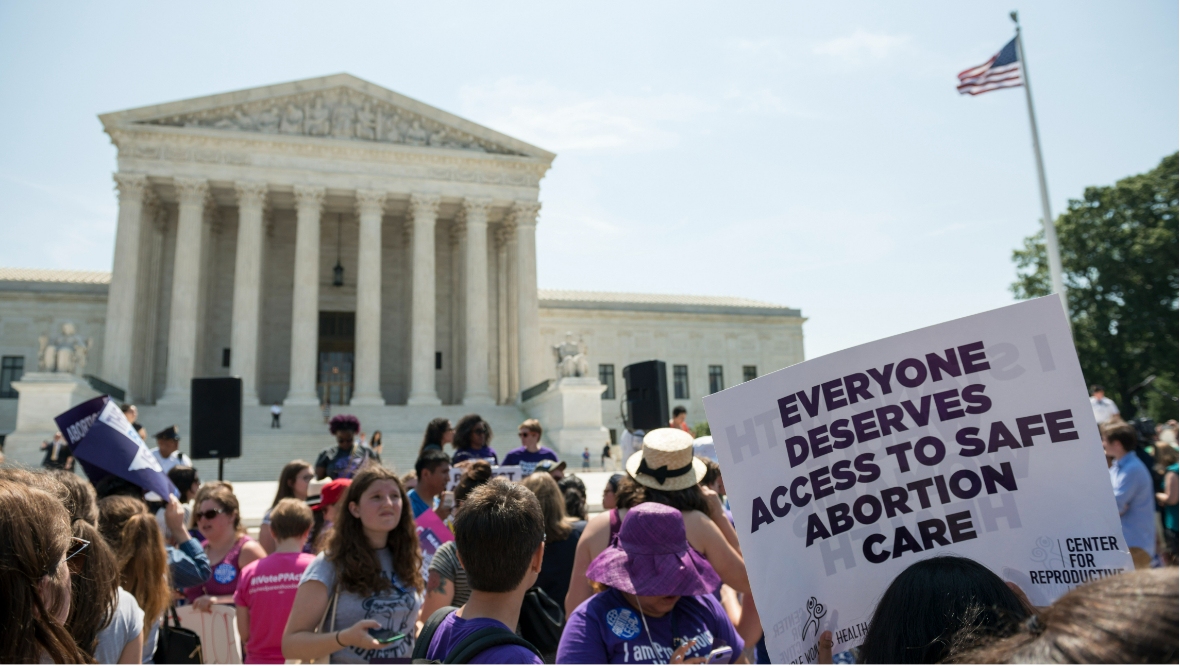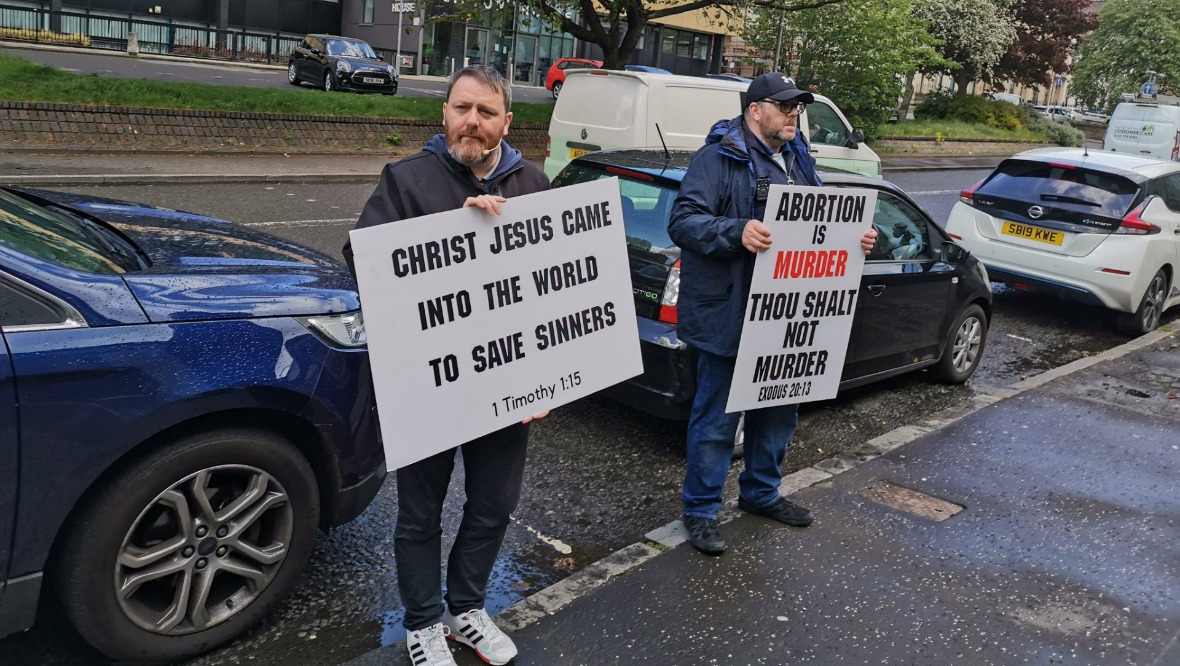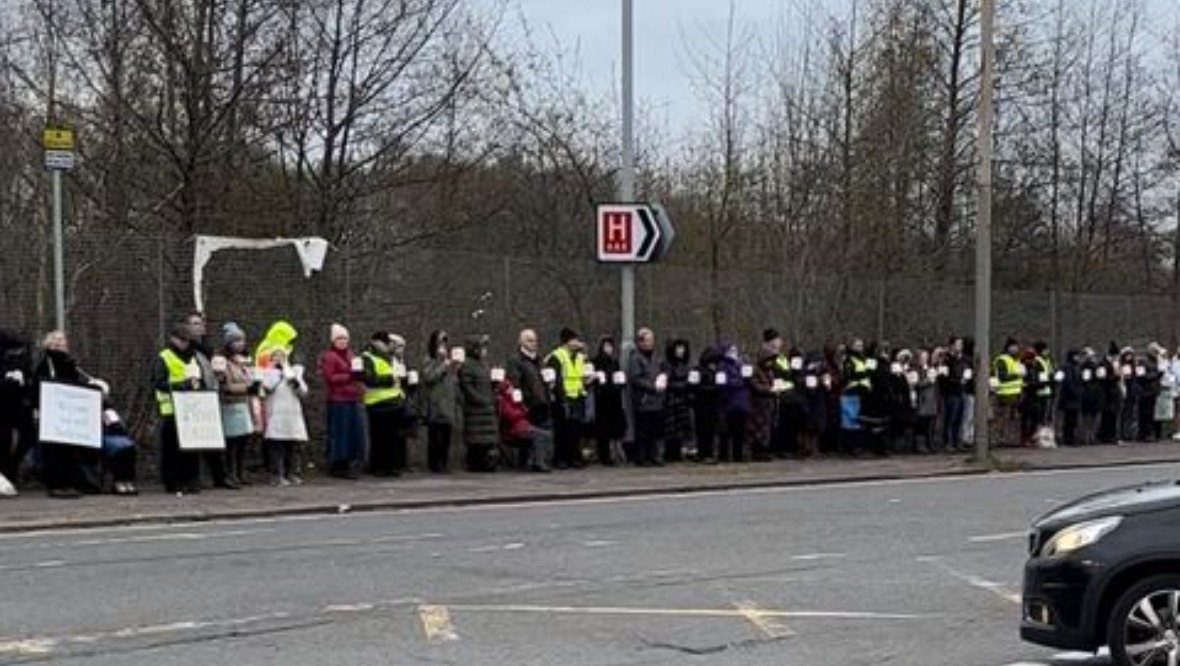Women in Scotland have been assured they will be able to access abortion without fear, harassment or intimidation at a summit held by Nicola Sturgeon.
The First Minister described the talks as an opportunity to “reaffirm women’s autonomy and right to choose”, as well as acting as a platform to discuss potential legislation aimed at preventing protests outside hospitals and clinics.
Glasgow could be the first city to introduce the measure in Scotland, potentially using council bylaws while Holyrood works to pass through legislation at a national level.
The city’s Sandyford Clinic and the Queen Elizabeth University Hospital are among the sites heavily targeted by protesters in recent months.
The summit comes in the wake of the Supreme Court’s overturning of the landmark Roe v Wade ruling in the United States, thereby ending the constitutional right to a termination.
Sturgeon described the ruling as “one of the darkest days for women’s rights in my lifetime”.
What happened at the summit?
The Abortion Care in Scotland summit in Edinburgh was held to ensure that women in Scotland can access services without being intimidated, as well as examining legislative mechanisms to establish 150 metre buffer zones around clinics.
It also sought to identify immediate, short term actions to protect women following protests by anti-abortion campaigners outside such facilities in recent weeks.
Those at the summit heard “powerful lived experiences” from women and medical staff who have encountered anti-abortion campaigners.
“There’s no doubt in my mind that we need to find a national legislative solution to this,” Sturgeon told STV News.
“There are some hurdles to overcome and in the short term we need to work with local authorities and police to ensure women can access healthcare without intimidation or harassment.”
Issues such as improving access to second trimester abortions in Scotland and establishing effective buffer zones were top of the agenda.
The summit brought together representatives from local government, third sector organisations, Police Scotland, the NHS and campaigners, and included cross-party representation.
 iStock
iStockThe campaign for buffer zones
Scottish Green MSP Gillian Mackay last month launched a consultation on her proposed Member’s Bill, which would see 150-metre buffer zones put in place around healthcare facilities that provide abortion services.
The Scottish Government said it is committed to working constructively with Mackay on her Bill.
Mackay said she hopes the summit can identify interim solutions to tackle unacceptable behaviour while the Bill is passing through the parliamentary process.
She said: “My Bill will provide peace of mind to all those accessing abortion services, by introducing protest-free buffer zones around clinics.
“There is no place for the type of intimidation and harassment we are regularly seeing outside these healthcare facilities at the moment.
“Both healthcare staff, and those accessing services, have relayed horrifying stories of the impact this harassment can have.
“While the parliamentary process can seem frustratingly slow, it is right that there is time for thorough consultation and scrutiny before any proposal becomes law.
“In the meantime, I believe there are a number of options that could be taken forward as interim solutions, particularly in the most egregious examples of this intimidatory behaviour.”
 STV News
STV NewsWhat is being said about buffer zones?
Sturgeon said that the proper focus for anyone protesting against abortion should be Parliament and lawmakers – not hospitals or sexual health clinics.
She said: “Gatherings of this kind create additional stress for anyone using these facilities, for any purpose, and for those who work in them. But for women accessing abortion services the upset, distress and fear that they cause can be profound.
“At what is already a very stressful time, women are being forced to see or make their way past these groups on the way in. And once they’re inside, on top of everything else, there’s the knowledge that they may have to see them again on the way out.
“In my view, the current situation is unacceptable, and it’s one which we must address as a matter of urgency. I am determined that we do so.
“There are issues that we need to solve to establish buffer zones through legislation but if we work together in a spirit of solidarity, I am confident we can find a way.”
Meanwhile women’s health minister Maree Todd said legislation to introduce buffer zones is “necessary”, but said it is also important any new laws do not restrict human rights.
Speaking to the BBC’s Good Morning Scotland programme on Monday, she said: “We are very careful in Scotland when we legislate to restrict people’s human rights.
“Human rights are precious, and in Scotland they’re built into the devolution settlement, so we’re not able to make law in a way that restricts people’s human rights, so we have to be careful that we balance everyone’s human rights and that we act in a necessary and proportionate way.”
 Back Off Scotland
Back Off ScotlandPro-life MSP criticised over Roe v Wade response
SNP MSP John Mason has voiced support for the US Supreme Court’s overturning of Roe v Wade.
Mason has previously admitted to attending an anti-abortion vigil and said abortion is “seldom essential or vital.”
This drew a response from Todd who tweeted: “For the avoidance of doubt: There is nothing positive about the recent US court ruling. Abortion has been legal in Scotland for over 50 years.”
“There will be no change to that. Abortion is legal up to 24 weeks in Scotland. There will be no change to that.”
The FM told STV she “vehemently disagrees” with Mason and said the overturning of Roe v Wade will have a “horrific and catastrophic impact on women.”
Glasgow and Edinburgh could be test councils
Glasgow and Edinburgh are possible locations to bring in Scotland’s first buffer zones using bye-laws but discussions are in the early stages.
A government spokesman said: “We continue to encourage local authorities to use bye-laws to establish buffer zones, which would act in the same way, and are committed to continuing to work with COSLA and local authorities to make progress.
“Following discussion at the summit today the Scottish Government and Local Government have committed to convene further discussions on how best to make progress.
“First Minister Nicola Sturgeon said that Glasgow and Edinburgh are possible locations as a test councils for buffer zone byelaws but it wouldn’t be appropriate to name a location ahead of discussions with COSLA and local authorities.
”We fully support Police Scotland to take appropriate and proportionate action in response to any issues that arise at protests and abortion vigils. It is for Police Scotland to decide when public order laws or antisocial behaviour should be invoked in response to the particular circumstances of a situation.”
Follow STV News on WhatsApp
Scan the QR code on your mobile device for all the latest news from around the country


 Twitter
Twitter
























